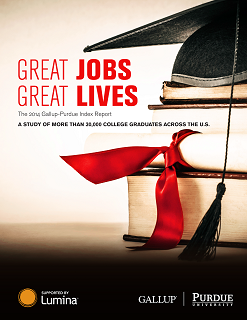If an employed U.S. college graduate recalls having a professor who cared about them as a person, one who made them excited about learning, and having a mentor who encouraged them to pursue their dreams, that graduate's odds of being engaged at work more than double. Yet, only 14% of college graduates strongly agree that they had support in all three of those areas.
These findings are from the Gallup-Purdue Index: A Study of More Than 30,000 College Graduates Across the U.S. report, which Gallup released Tuesday. This new report is based on a nationally representative study of U.S. college graduates with Internet access. It provides insights for colleges, educators, employers, and students on the factors that contribute to key outcomes for college graduates: having a "great job" and a "great life." Gallup and Purdue will discuss the implications of these findings at an event Tuesday morning at the Gallup World Headquarters in Washington, D.C.
Here are some key insights from this report:
- As many graduates from the Top 100 U.S. News & World Report schools are engaged in their work and are thriving in all elements of well-being as graduates from other institutions.
- If employed graduates feel their college prepared them well for life outside of it, the odds that they are engaged at work increase nearly three times.
- Fifty-four percent of college graduates are thriving in purpose well-being; 49% are thriving in social well-being, 47% in community well-being, 42% in financial well-being, and 35% in physical well-being.
- There are no differences between graduates of public versus not-for-profit private colleges on employee engagement or well-being, but there are substantial differences between graduates of for-profit institutions and the rest.
- There were no differences in employee engagement by race or ethnicity, or by whether the graduate had been the first in the family to attend college.
- The higher the amount of school loans that graduates took out for their undergraduate education, the worse off their well-being is.
- Twenty-nine percent of graduates who are attached to their alma mater are thriving in well-being, versus 4% who are actively unattached to their colleges.
For more findings, read the full report. Watch a live stream of the event Tuesday from 11:15 a.m.-1:15 p.m. ET, or follow along on Twitter using #GallupPurdue.


